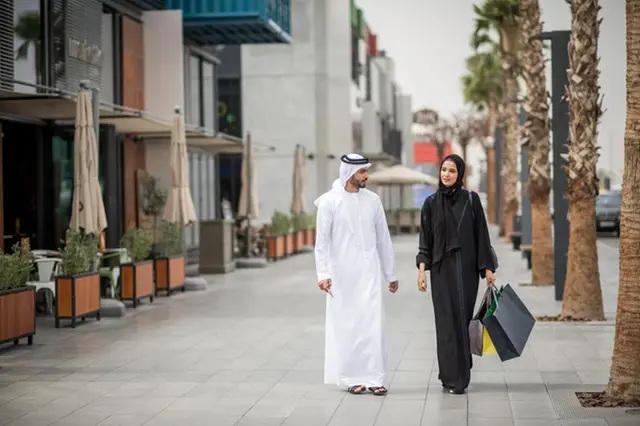Majid Al Futtaim, the leading shopping mall, communities, retail, and leisure pioneer across the Middle East, Africa, and Asia, today released its annual ‘State of the UAE Retail Economy’ report for 2023. The report, which highlights key economic data, trends and insights into consumers’ behaviour patterns, spending habits, and sentiment across the Emirates, revealed that the UAE economy has remained resilient amid recent geopolitical tensions and economic headwinds, with the country’s Gross Domestic Product (GDP) expanding 3% on the back of a robust performance from non-oil sectors.
Consumer spending in the retail economy displayed robust growth throughout the year, delivering a 13% increase in 2023 vs. 2022. While data showed a slowdown across the retail sectors in H2 2023 vs. H2 2022, this was found to be the result of a higher base effect from the previous year’s FIFA World Cup, which had given impetus to consumer spending due to a surge in tourism for that period. Overall, absolute consumer spend in 2023 was split evenly across the first half and the second half of the year, driven by a 14% increase in the UAE’s retail economy, including fashion (31%), general retail (16%), leisure and entertainment (15%), and hypermarkets and supermarkets (3%), and a 12% increase in non-retail spending in areas such as real estate services (100%), petrol and gas stations (28%), transportation (57%), and airlines (25%).
Ahmed Galal Ismail, Chief Executive Officer at Majid Al Futtaim – Holding, said: “The UAE’s far-ranging social and economic ambitions continue to fuel the Nation’s success in creating long-term prosperity for its people. Over the past 12 months, its proven resilience to external pressures, coupled with progressive policy-making and an investor-friendly business environment has seen the UAE further strengthen its position as a lighthouse for the MENA region.
Bucking global trends, the Nation’s ability to act as a magnet for global talent, investors and entrepreneurs, has translated to a record number of visitors, far surpassing pre-COVID levels, fuelling consumer confidence and further contributing to its thriving retail sector. Looking ahead, buoyed by positive retail economy indicators, the UAE is well-positioned to continue its remarkable growth trajectory.”
The UAE successfully reduced inflation from a high of 5.2% in 2022, to 3.3% in 2023. Inflation in the country remained below the global average (at 6.9%), and considerably lower than the Middle East average (at 13.9%), sheltering consumers from most of the pressures emanating from the cost-of-living crisis experienced around the world in 2023.
E-commerce
E-commerce penetration in the UAE has more than doubled since 2019, rising from 5% in 2019 to 12% in 2023, with approximately 70% of transactions attributed to mobile phones. Consequently, the recorded growth in consumer spending was spurred by higher levels of accessibility brought on by an e-commerce boom, which has not slowed since the onset of the pandemic. Supported by the UAE’s Digital Economy Strategy which aims to double the contribution of the digital economy to GDP by 2032, and owing to world-class logistics and advanced digital infrastructure, there was a 15% increase in e-commerce consumer spending in the UAE retail economy in 2023, according to Majid Al Futtaim Point of Sales (POS) data.
A majority of the growth in e-commerce spend was driven by increases in consumer spending within hypermarkets and supermarkets (19%), and retail general categories such as F&B (57%), electronics (271%), and hotels (10%), supported by a digitally savvy population and a strong fintech sector.
Travel and Tourism
The UAE’s travel and tourism sectors witnessed significant growth in 2023, with tourist numbers surpassing pre-pandemic levels for the first time. More than half (53%) of international visitors came from Western Europe, South Asia, and the GCC. There was a notable surge in Chinese visitors, which rose by 287% compared to 2022.
Dubai alone hosted 17.2 million overnight international visitors in 2023, a 19% year-on-year increase, with Dubai International Airport (DXB) experiencing its highest quarterly traffic in Q3 since 2019. As a result, hotel occupancy records hit a record high of 77% in 2023, up from 73% in 2022. The success of the country’s travel and tourism sector is in line with the UAE Tourism Strategy 2031, which aims to attract AED 100 billion in tourism investments and accommodate 40 million hotel guests by 2031.
Real Estate
Following a very strong performance in 2022, the UAE’s real estate market continued to thrive in 2023 marking a record-breaking year both in terms of property sales volumes and value. Transactions were up 18% compared to 2022, with sales values increasing by 39% to AED 370 billion in 2023. Dubai, in particular, has seen a rapid increase in property prices, growing by over 20% annually in 2023, making it the second-fastest growing real estate market in the world.
The full report can be accessed here.

